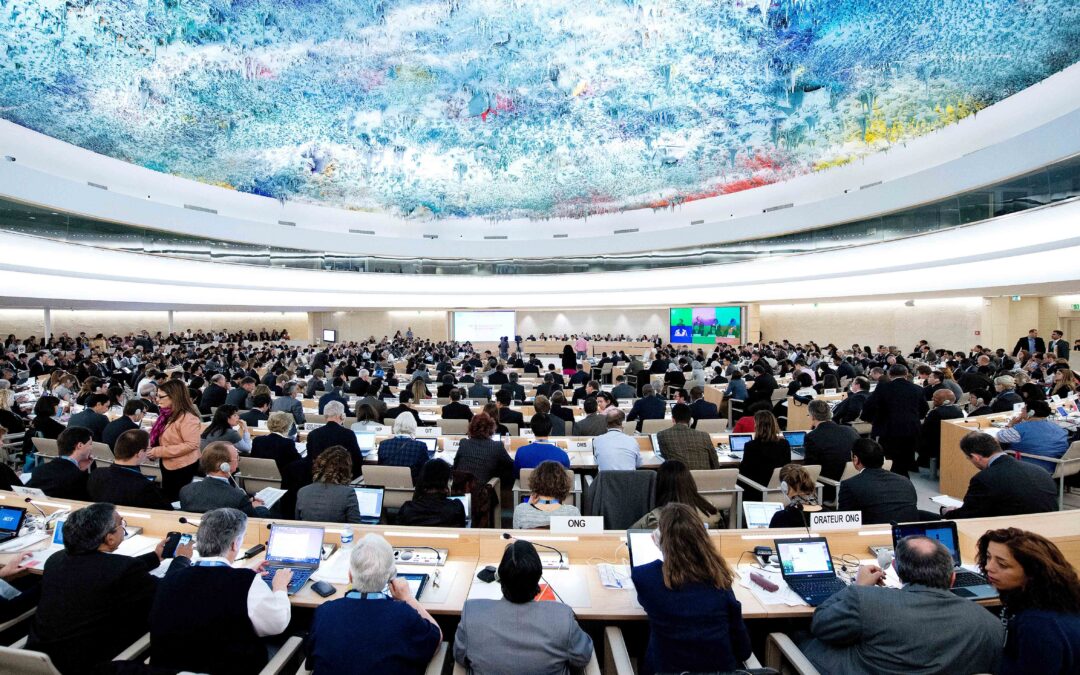
Jul 1, 2019 | Advocacy, Non-legal submissions
The ICJ today joined other NGOs in calling on States to do more to save lives and uphold human rights of migrants, including by recognising the role of civil society and creating an environment for its work.
The statement to the UN Human Rights Council, delivered on behalf of the group of NGOs by the International Catholic Migration Commission, read as follows:
“We are deeply concerned by widespread and growing violations of the human rights of migrants and an environment where those who seek to protect them are increasingly criminalized.
The Global Compact for Migration provides technical guidance and a cooperative framework for the implementation of existing legal commitments. It is mobilizing resources to support States in this.
We are asking you to do more and to do better to save lives and uphold human rights. The Compact can help you do this.
Civil Society is already using the Compact at regional and national level, often in partnership with States, for example:
- Civil society in Central America are developing a pilot programme to identify missing migrants to support States’ implementation of Objectives 8 and 9.
- Migrant Forum in Asia has led consultations with governments and other stakeholders throughout Asia.
- Cross-Regional Center for Refugees and Migrants has developed a baseline assessment on the GCM for the MENA region.
- The International Detention Coalition is working with States to develop a cross regional platform on alternatives to child immigration detention in line with Objective 13(h)
We believe these activities can inspire similar measures, but we need all States to create an environment that enables us to do so and we need all States to take leadership on implementation.
The human rights of migrants deserve the acknowledgement, respect, and urgent action of all of us.”
Delivered by the International Catholic Migration Commission, the statement was co-sponsored by the following ECOSOC accredited NGOs:
- ACT Alliance
- Alianza Americas
- Asylum Access
- Caritas Internationalis
- Congregation of Our Lady of Charity of the Good Shepherd
- Congregations of St. Joseph
- Defence for Children International
- International Catholic Migration Commission
- International Commission of Jurists
- International Council of Voluntary Associations (ICVA)
- International Detention Coalition
- International Movement Against All Forms of Discrimination and Racism (IMADR)
- Migrant Forum in Asia
- Save the Children
- Terre des Hommes International Federation
- Translators without Borders
- Vivat International
- World Organization for Early Childhood Education (OMEP)
The statement was also supported by the following NGOs and networks who do not have ECOSOC accreditation:
- Action Secours Ambulance (ASA)
- Asia Pacific Refugee Rights Network (APRRN)
- Asociación Rumiñahui
- Bloque latinamericano y el Caribe sobre Migración
- Casa Monarca ayuda humanitaria al migrante
- Center for Migrant Advocacy, Philippines (CMA-Phils)
- Centro de Atención y Desarrollo Integral Migrante (CADIM Oxnard)
- Centro de Recursos Centroamericanos Del Norte California (CARECEN)
- Centro de Atención a la Familia Migrante e Indígena (CAFAMI)
- Civil Society Action Committee
- Comision de Accion Social Menonita (CASM)
- Destination Unknown Network
- Estancia del Migrante González y Martínez
- FM4 – Paso Libre
- Fundación para la Justicia y el Estado Democrático de Derecho
- Global Coalition on Migration
- Institution para las Mujeres en la Migración (IMUMI)
- Instituto de Estudios y Divulgación sobre Migración (INEDIM)
- International Presentation Association
- NGO Coalition on Migration
- Organismo Cristiano de Desarrollo Intergral de Honduras (OCDIH)
- Pacific Islands Association of Non-Government Organisation (PIANGO)
- Plateforme des Organisations Nationales et Territoriales (Pont-Sch)
- Red de Mujeres del Bajío
- Red Internacional de Migración y Desarrollo
- Red Jesuita con Migrantes de América Latina y Caribe (RJM-LAC)
- Religious of the Sacred Heart of Mary
- Solidarity Centre
- The Mixed Migration Centre
- Women in Migration Network
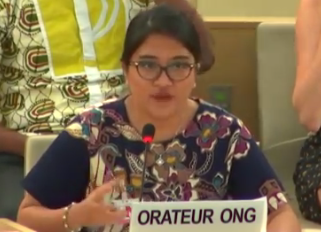
Jun 27, 2019 | Advocacy, Non-legal submissions
The ICJ highlighted the role of women in ensuring respect for human rights in relation to businesses, in a statement to the UN Human Rights Council today.
In an oral statement made during an interactive dialogue with the Working Group on Discrimination Against Women and the Working Group on the issue of human rights and transnational corporations and other business enterprises, the ICJ stated as follows (check against delivery):
The International Commission of Jurists (ICJ) welcomes the report of the Working Group on the issue of human rights and transnational corporations and other business enterprises, and agrees that despite years of progress, women continue to experience multiple forms of discrimination. Women’s voices continue to be unheard and they face insurmountable challenges as they use these voices to access justice on behalf of their communities.
We have seen numerous cases where women lead their communities in protesting abuses committed by business enterprises. Many of these communities are located in remote areas, far from courts or other mechanisms that could be used by them to seek justice. The women who lead these communities often do not identify as women human rights defenders. They see themselves as mothers protecting the health of their families or the land from which they grow their food and earn their living. Because of where these communities are located, local government authorities play a significant role on whether or not these women are heard or are able to access justice.
The women farmers of Kendeng in Indonesia, for instance, have been protesting the operation of a cement factory in their area, which contaminate their water and land. In 2016, the Supreme Court of Indonesia had already ruled in favor of these women farmers and their community, and ordered the revocation of the cement factory’s permit. To this day, however, the cement factory continues to operate, ignoring the final order of the Supreme Court. The Kendeng women farmers have raised the non-implementation of the Supreme Court’s order with the Governor of Central Java and the Indonesian government, but their voices remain unheard.
In the Philippines, the women community leaders of Pio V. Corpus, Masbate, have been protesting plans to establish a cement factory and a coal-fired power plant in their town. They allege that their local government leaders approved plans for this factory and power plant without consultation and in blatant disregard of the disastrous impact these would have on the environment and people’s health.
Mr. President, we join the Working Group in urging States and business enterprises to ensure meaningful participation of potentially affected women in all stages of human rights due diligence. We also urge States to take measures to ensure that women – wherever they may be located – are able to access justice for abuses committed by business. Finally, we recommend that local government authorities be made aware of the Guiding Principles and able to integrate the gender framework and guidance in discharging their human rights responsibilities.
Thank you.
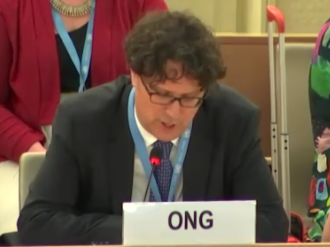
Jun 25, 2019 | Advocacy, Non-legal submissions
Speaking at the UN Human Rights Council in a general debate on the oral update of the High Commissioner for Human Rights, the ICJ addressed issues around “foreign fighters”, criminalisation of solidarity with migrants, and the need for international investigation of violations in the Philippines.
The statement was as follows (check against delivery):
“The International Commission of Jurists (ICJ) thanks the High Commissioner for her oral update.
The ICJ agrees that accountability for crimes under international law committed by foreign fighters is essential; equally, it must be ensured through fair procedures. Where children are concerned, their best interests must be the guiding principle. [To the extent foreign fighters are addressed in relation to counter-terrorism measures, ICJ emphasizes that not only is disregard for human rights in countering terrorism wrong and unlawful in itself, it is also ineffective and indeed itself conducive to terrorism.]
The ICJ is also concerned at the criminalisation of solidarity with migrants in Europe and elsewhere. No one should be penalised for supporting human rights, including those that States fail to uphold. On Thursday, together with the OHCHR and the Geneva Bar Association, ICJ will screen a documentary in Room XIV, the UN Cinema, showing the impact of criminalization of solidarity.
The ICJ supports calls by the High Commissioner and Special Procedures for urgent action by the Human Rights Council on the Philippines. Adoption of a resolution at the current session to establish an independent international investigation is essential.
The huge number of killings in the name of countering drugs is part of a broader pattern of impunity. For instance, at least 39 lawyers have also been killed under the current administration, some of whom were representing victims of human rights violations. A fully independent national commission of inquiry and measures actually to bring perpetrators to justice are also needed to end the pervasive culture of impunity.”
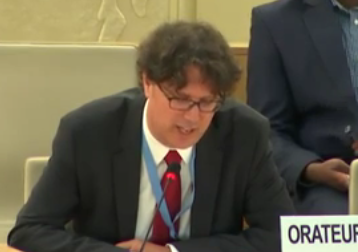
Jun 24, 2019 | Advocacy, Non-legal submissions
At the UN, the ICJ today highlighted the rights and duties of judges and prosecutors to exercise their freedoms of expression, assembly and association to defend the rule of law and human rights.
The oral statement was delivered in a Clustered Interactive Dialogue with the Independent Expert on Sexual Orientation and Gender Identity and the Special Rapporteur on the Independence of Judges and Lawyers, at the UN Human Rights Council in Geneva.
It read as follows:
“The International Commission of Jurists (ICJ) welcomes the report of the Special Rapporteur on the Independence of Judges and Lawyers on freedom of expression, association and peaceful assembly of judges and prosecutors.[1]
As the report acknowledges, exercise of these rights can be subject to restrictions arising from the fundamental need for judges and prosecutors to be perceived as independent and impartial. At the same time, as the report also emphasizes, any such restrictions must be provided by law and be demonstrably necessary to such legitimate aims, which in turn crucially requires proportionality.[2] These standards have been recognized both globally and in all regions of the world.[3] Any such restrictions on judges should be adopted and enforced by the judiciary itself.
We particularly welcome the recognition in the report that in situations where democracy and the rule of law are under threat, judges and prosecutors have not only the right, but potentially a duty, to speak out and organize in defence of democracy, the rule of law, and human rights, and that this can include participating in peaceful public demonstrations.[4]
Far too often in the ICJ’s work around the world, we see Executive and Legislative bodies, as well as compromised judicial hierarchies, arbitrarily or selectively targeting judges and prosecutors for removal, demotion or other disciplinary measures, precisely for exercising these rights to defend against threats to the rule of law. Examples highlighted in our submission to your study included Egypt, Morocco, Honduras, Hungary and Bulgaria.[5]
Mr. Rapporteur, how can judiciaries, governments, and civil society organisations (including international or regional legal professional associations) act internationally to support judges and prosecutors who are facing such abuse in another country?
The ICJ also welcomes the reports of the Independent Expert on protection against violence and discrimination based on sexual orientation and gender identity. We urge all States to strongly support the renewal of this essential mandate at the current session.
Thank you.”
[1] ICJ’s detailed submission to the Special Rapporteur’s consultation is available at: https://www.icj.org/judgesexpression2019/
[2] Paragraphs 39, 45, 46, 89.
[3] In addition to the global and European, Asian, and American standards cited in the report, see the African Commission on Human and Peoples’ Rights, Principles and Guidelines on the Right to a Fair Trial and Legal Assistance in Africa (2005), paras A(4)(s) and (t), and F(d) and (e).
[4] Paragraphs 61, 69, 90, 102.
[5] See for further information: https://www.icj.org/judgesexpression2019/
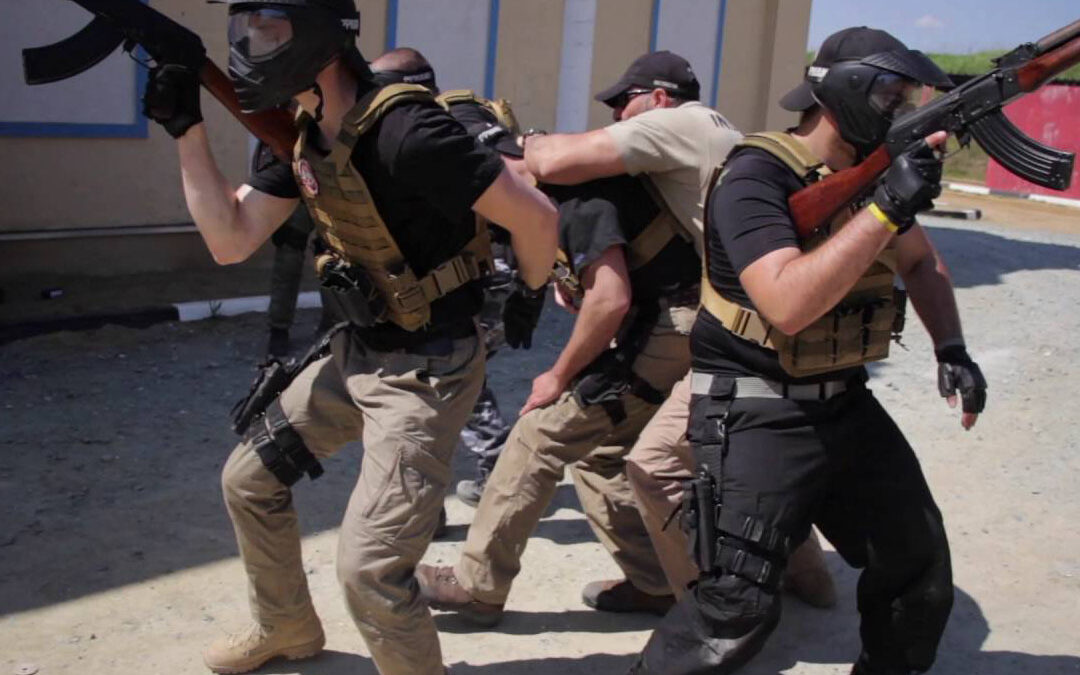
Apr 25, 2019 | Advocacy, Non-legal submissions
The ICJ draws attention to instances of alleged human rights abuses by the private military and security companies in all regions and analyses the challenges related to the accountability frameworks and access to justice.
The ICJ contribution is in response to the call by the UN Working Group on the use of mercenaries, which also has a mandate on private security companies, for written information to assist in its deliberations on “private military and security companies in extractive industries – impact on human rights”.
Private Military and Security Companies (PMSCs) are hired by companies engaged in extractive operations in all geographic regions of the world, but their activities or operations that give rise to allegations of human rights violations and abuses seem to be prevalent regions where abundance of natural resources and the favorable environment for foreign investment are propitious to the establishment of extractive companies in, many times, fragile contexts.
In this regard ICJ suggests the Working group to consider the following recommendations:
- States should ensure that their domestic legal framework provides for real access to effective remedies for victims of human rights abuse by PMSCs and extractive companies.
- Provide guidance to States to establish effective legal accountability frameworks of criminal or civil nature that pay due consideration to the inherently dangerous nature of the mining activity and the security services operating in that context.
- Recommend that States establish legal frameworks that require meaningful reporting/disclosure of company policies and practices in relation to human rights, including their use and effectiveness of grievance mechanisms at the operational level.
- Both extractive and security companies should respect all human rights in accordance with international standards, including the UN Guiding Principles on Business and Human Rights, the Voluntary Principles on Security and Human Rights and other sectorial guidance applicable to PMSCs.
- Security companies, whatever their structure or ownership, should carry out enhanced processes of due diligence consistent with international best practices, and participate in remediation schemes.
Universal-ICJ Submission PSC and extractive industries-Advocacy-non legal submissions-2019-ENG (full text of the report, in PDF)
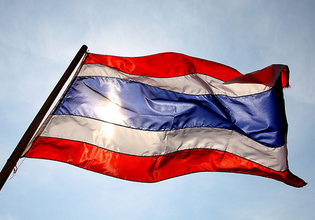
Apr 22, 2019 | Advocacy, News, Non-legal submissions
Today, the ICJ submitted recommendations to the Council of the State calling for the repeal or amendment of National Council for Peace and Order (NCPO) and Head of the NCPO (HNCPO) orders and announcements in line with Thailand’s international human rights law obligations.
The ICJ was informed by the Ministry of Foreign Affairs that the Council of the State had been tasked to review the necessity and relevance of announcements, orders, and acts of the NCPO and of the HNCPO in February 2019.
The review process is in line with Thailand’s declaration to the UN Human Rights Committee in its Follow-Up to the Concluding Observations of the Committee, submitted on 18 July and published on 10 August 2018.
In its submission to the Council of the State, the ICJ has called for the review process of HNCPO and NCPO announcements and orders to be carried out with increased public participation, openness, and transparency.
The ICJ has also made recommendations on the repeal and amendment of the following HNCPO and NCPO orders and announcements since they are clearly inconsistent with Thailand’s international human rights law obligations and the 2017 Constitution, and are neither necessary, nor proportionate, nor relevant to the current situation:
- Orders that provide the military with superior powers beyond civilian authorities;
- Orders that allow military courts to prosecute civilians;
- Orders that infringe on the rights to freedom of expression and assembly, restrict media freedom and the right to information; and
- Orders that infringe on community and environmental rights.
As main priorities, the ICJ has recommended that:
a) the exercising of law enforcement powers by military personnel to arrest and detain suspects in places not formally recognized as places of detention without judicial review should end;
b) all cases of civilians facing proceedings before military courts be transferred to civilian courts, and all civilians convicted of an offence in military courts be guaranteed a re-trial in civilian courts; and
c) all other HNCPO and NCPO orders and announcements should be repealed or amended to bring Thailand in compliance with its international human rights law obligations, and to ensure that the rights to freedom of expression, opinion and assembly, and environmental rights, among others, be respected.
Thailand-civilian prosecutions military courts-Advocacy-Non-legal submissions-2019-ENG (PDF in English)
Thailand-civilian prosecutions military courts-Advocacy-Non-legal submissions-2019-THAI (PDF in Thailand)
Further readings:
Post coup’s legal frameworks
Thailand: ICJ alarmed at increasing use of arbitrary powers under Article 44
Joint submission to the UN Human Rights Committee by the ICJ and Thai Lawyers for Human Rights
The ICJ and other groups made a joint follow-up submission to the UN Human Rights Committee
Thailand: statement to UN on situation for human rights
ICJ and Thai Lawyers for Human RIghts’ submission to the Universal Periodic Review (UPR) of Thailand
Military officers in law enforcement missions
Thailand: immediately end the practice of arbitrarily detaining persons in unofficial places of detention
Thailand: The ICJ and Human Rights Watch express concerns over detentions
The Use of Military Court
Thailand: transfer all civilians to civilian courts
Thailand: End prosecution of civilians in military tribunals
Thailand: ICJ welcomes Order phasing out prosecution of civilians in military courts but government must do much more
Freedom of expression and assembly
Thailand: lifting of the ban on political activities is welcome but more is needed
Thailand: Lift ban on political gatherings and fully reinstate all fundamental freedoms in Thailand
Thailand: misuse of laws restricts fundamental freedoms (UN statement)
Community and environmental rights
“Development” and its discontents in Thailand
Thailand: ICJ submission to the UN Committee on Economic, Social and Cultural Rights










